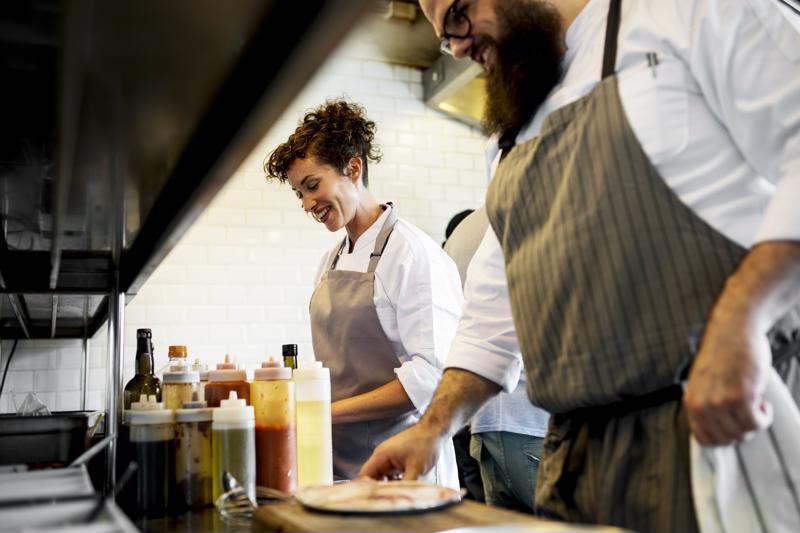When culinary careers come to mind, the focus is often on prep, working on the line and playing a critical role in successful service day after day. While these are foundational aspects of every chef's career, those in more senior positions must also take hiring, training and staff management into account.
Students at leading online culinary schools develop a full spectrum of skills necessary for long-term work in the culinary field, focusing on food along with topics ranging from controlling costs and business oversight to leadership in the back of house and managing staff. Let's look at the current state of hiring and retention for back of house workers in restaurants and how you can positively influence these efforts once you move into a more senior chef role.
 Training and educational opportunities can aid retention efforts.
Training and educational opportunities can aid retention efforts.Recognizing high turnover in the industry
The hospitality sector as a whole has a historic perception of high turnover. That issue has continued into the present day, with the National Restaurant Association pointing out the annual employee turnover rate for hospitality workers in 2018 was 74.9%. That's significantly higher than total U.S. private sector turnover of 48.9%. A number of factors influence this especially high turnover rate, including restaurants employing a large number of students, younger workers and seasonal staff. Additionally, upward mobility as a culinary professional is often achieved by moving from one kitchen to another, and restaurants are an especially common type of business in many areas.
While these reasons help provide context for the high rate of turnover, they don't offer a clear solution for lowering it. The value of hiring students and young workers for the more junior positions within the back of house is clear. They gain exposure to and experience in a field that can offer job and career opportunities far into the future, while your restaurant benefits from their generally high level of physical ability and relatively low labor costs.
Strategies for retaining staff and promoting from within
If the average kitchen can expect to lose roughly three of every four workers on a yearly basis, a restaurant that can reduce turnover and keep more experienced staff on board for a longer period of time can realize some significant benefits. As a senior or head chef, you'll have to make some important considerations when it comes to retaining staff, providing opportunities for advancement and training those employees for new roles.
Retention and advancement
- Recognize that some employees will eventually leave. Develop a plan for adjusting to their departure that addresses the division of their responsibilities in the short term.
- Discuss potential career paths with new hires, as Recruiter suggested, and hold periodic follow-up conversations with them about the same topic.
- Offer promotions when warranted, and include some type of reward or wage increase.
- When possible, offer benefits like sick leave and insurance across the board.
Training existing staff
- Develop standardized training processes that new and existing staff can clearly follow.
- Offer everyone from dishwashers to sous chefs the opportunity to learn new skills and build their competencies.
- Provide opportunities to demonstrate and improve those new skills.
A comprehensive culinary education includes all aspects of the professional responsibilities chefs encounter when at work, from cooking to managing and interacting with superiors, co-workers and subordinates. The Auguste Escoffier School of Culinary Arts emphasizes the critical leadership and administrative work chefs have to take on to truly be successful in the industry, including personalized support from professional chef educators who can speak from experience.
No matter where you're located, our online culinary school program can prepare you for a leadership role in a variety of foodservice settings. To learn more, get in touch with us today.

